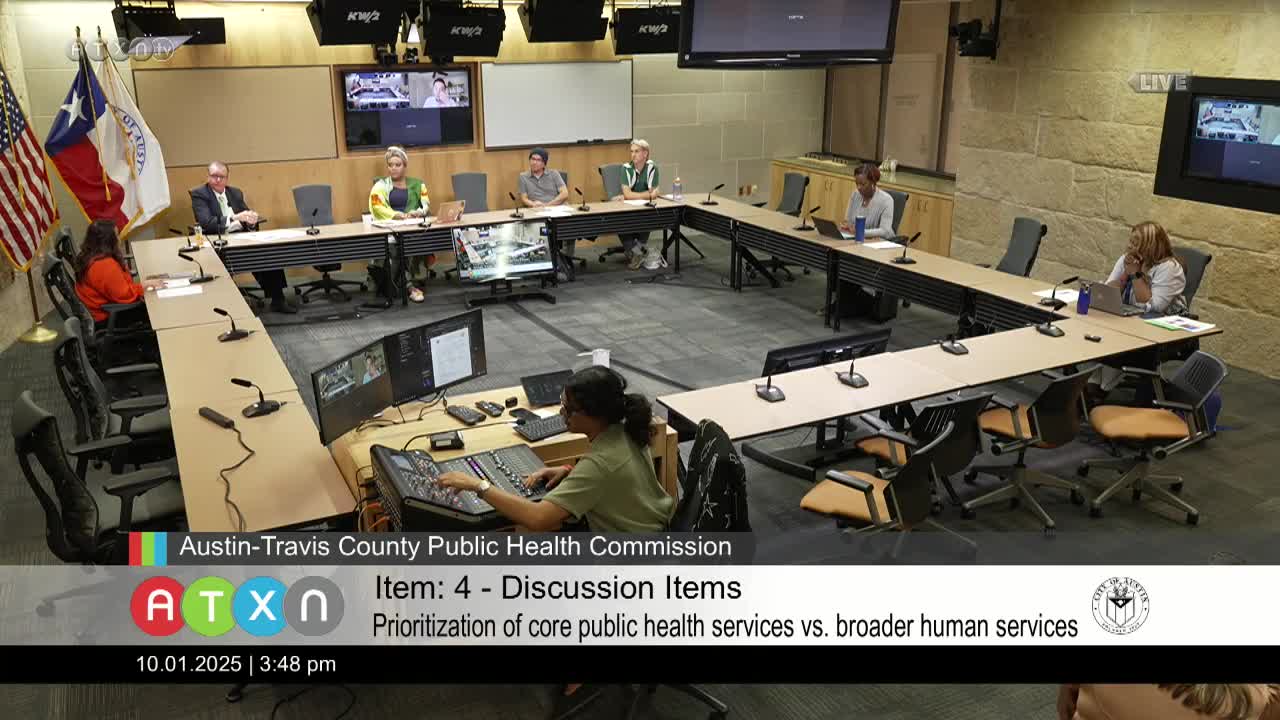Public Health Commission discusses 5% budget recommendation amid funding uncertainties
October 01, 2025 | Austin, Travis County, Texas
This article was created by AI summarizing key points discussed. AI makes mistakes, so for full details and context, please refer to the video of the full meeting. Please report any errors so we can fix them. Report an error »

In the heart of Austin, Texas, a pivotal meeting unfolded as members of the Public Health Commission gathered to discuss the future of health funding in Travis County. The atmosphere was charged with urgency as officials recognized the critical need for financial resources to support community health initiatives.
One of the central topics of discussion was the reimbursement structure for Community Health Workers (CHWs) and case management services. Currently, funding primarily covers children and pregnant women enrolled in Medicaid and CHIP. A commission member emphasized the importance of reallocating resources to assist uninsured individuals who often fall through the cracks of the healthcare system. “We need to utilize our CHWs not just for case management but also for education,” they stated, highlighting the trust and relationships CHWs have built within their communities. This approach could not only enhance service delivery but also free up funds for broader health initiatives.
The conversation then shifted to the overall budget for Austin Public Health (APH). A proposal emerged to recommend that the APH budget be set at 5% of the city’s overall budget. This suggestion was met with enthusiasm, as members recognized that a stable funding base could help mitigate future cuts and support a wide range of health issues. “This would help every issue,” one commissioner remarked, underscoring the interconnectedness of health funding and community well-being.
As the meeting progressed, the commissioners began to contemplate the next steps. They discussed the timing for formalizing their recommendations, considering whether to act early in the coming year. The urgency of their discussions reflected a shared commitment to ensuring that all residents of Travis County have access to essential health services, regardless of their insurance status.
As the meeting concluded, the commissioners left with a renewed sense of purpose. The path forward was clear: advocate for increased funding and leverage the invaluable work of CHWs to create a healthier, more equitable community. The discussions held that day could very well shape the future of public health in Austin, ensuring that no one is left behind in the quest for better health outcomes.
One of the central topics of discussion was the reimbursement structure for Community Health Workers (CHWs) and case management services. Currently, funding primarily covers children and pregnant women enrolled in Medicaid and CHIP. A commission member emphasized the importance of reallocating resources to assist uninsured individuals who often fall through the cracks of the healthcare system. “We need to utilize our CHWs not just for case management but also for education,” they stated, highlighting the trust and relationships CHWs have built within their communities. This approach could not only enhance service delivery but also free up funds for broader health initiatives.
The conversation then shifted to the overall budget for Austin Public Health (APH). A proposal emerged to recommend that the APH budget be set at 5% of the city’s overall budget. This suggestion was met with enthusiasm, as members recognized that a stable funding base could help mitigate future cuts and support a wide range of health issues. “This would help every issue,” one commissioner remarked, underscoring the interconnectedness of health funding and community well-being.
As the meeting progressed, the commissioners began to contemplate the next steps. They discussed the timing for formalizing their recommendations, considering whether to act early in the coming year. The urgency of their discussions reflected a shared commitment to ensuring that all residents of Travis County have access to essential health services, regardless of their insurance status.
As the meeting concluded, the commissioners left with a renewed sense of purpose. The path forward was clear: advocate for increased funding and leverage the invaluable work of CHWs to create a healthier, more equitable community. The discussions held that day could very well shape the future of public health in Austin, ensuring that no one is left behind in the quest for better health outcomes.
View full meeting
This article is based on a recent meeting—watch the full video and explore the complete transcript for deeper insights into the discussion.
View full meeting
